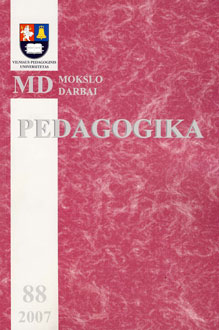Pilietinio ugdymo galimybės tautinių mažumų pradinėje mokykloje
Possibilities for Сitizenship Education in Primary School of National Minorities
Author(s): Nadežda Antonceva, Irena ZaleskienėSubject(s): Education
Published by: Vytauto Didžiojo Universitetas
Keywords: citizenship education; national minorities; civic knowledge
Summary/Abstract: The problems of education for active citizenship are discussed in the article on die bases of literature analyses. Special attention is paid for civic education of primary students in the schools of of national minorities. The analyses of the juridical documents national as well as european influencing the framework of cultural rights of national minorities and policies for civic education is presented. Second part of the article deals with the analyses of data of the empirical research which was carried out in die primary schools of national minorities. It is shown that there are many possibilities for developing active citizenship for students with multicultural background. Authors of the paper present following of them: curriculum of the primary school, extra-curriculum activities and opportunities which are given with maintenance of connections with a local community. The primary school curriculum gives am excellent opportunity because a lot of civic issues are integrated into different subjects. For example, into the lidiuanian as state language course, into social education course "me and the world", ethics, native language, mathematics, works, the fine arts. It was shown by respondents (teachers) that most successful example of integration is "me and the world" course. And majority of teachers considered, that the most successful method for educating active citizens in primary school is discussion (42 % of respondents), different kind of simulations (24 % of respondents), work in the small groups (17 %). On the bases of data die conclusion is drawn diat primary students from schools of national minorities have full extenx civic knowledge which are required by natioanl standards of students achievements. For example, students know the name of the president of republic of Lithuania (99 % of respondents), what is the name of capital of Lithuania (98 % of respondents), etc. Primary students are active participants of the national holidays. For example, about 60 % of them do participate in the lidiuanian independence day, 99 % of respondents are actively involved in different kind of elections which take place in the school community (team leader, peer group leader, etc).
Journal: Pedagogika
- Issue Year: 2007
- Issue No: 88
- Page Range: 7-12
- Page Count: 11
- Language: Lithuanian

